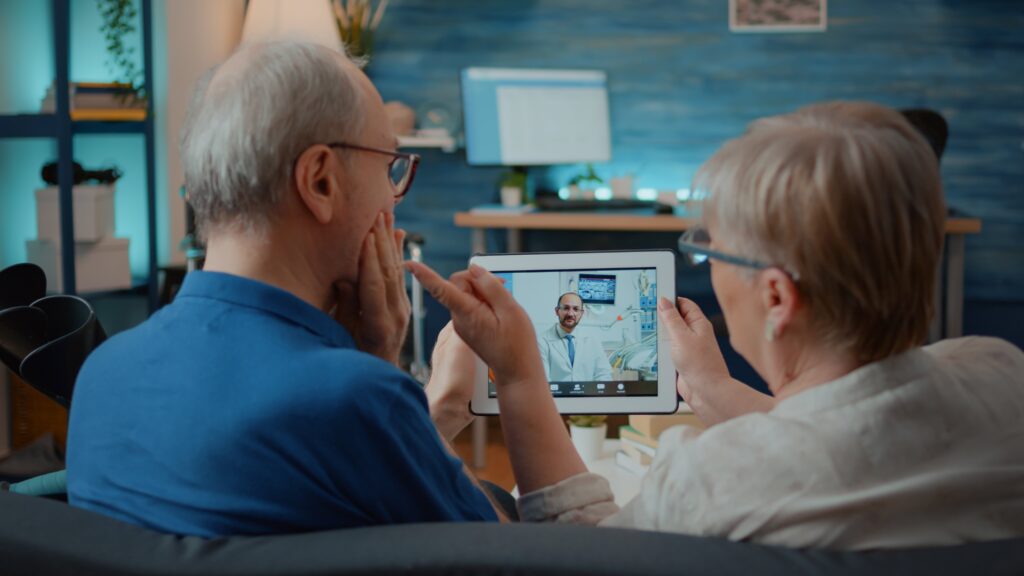How is AI being used in home healthcare in 2025?
In 2025, AI is being used in home healthcare to support, not replace, human care. Families most often see it through tools that help caregivers stay organized, monitor health changes, and respond more quickly when something feels off. This can include reminders for medications, alerts when routines change, better care coordination between providers, and smarter scheduling so caregivers are more consistent. When used correctly, AI helps care teams notice problems earlier and gives families more peace of mind, while real people still provide the hands-on care and emotional support that seniors need.
Technology has always held the promise of making our lives better, but when it comes to caring for our loved ones, artificial intelligence in home healthcare represents something truly extraordinary. For families navigating the complex world of home care, AI isn’t just about gadgets and algorithms—it’s about peace of mind, enhanced safety, and the ability to provide the kind of personalized attention that every person deserves.
The world has witnessed firsthand how AI tools are revolutionizing the way compassionate care is delivered. From intelligent monitoring systems that alert families to changes in their loved one’s condition to smart medication reminders that prevent dangerous oversights, these technologies are enhancing the ability to care with all our heart while ensuring no detail goes unnoticed.
Recent studies show that 53% of healthcare leaders already recognize AI’s powerful role in improving patient outcomes, especially in home care. But this isn’t about replacing the human connection—it’s about enhancing the caregiver’s ability to provide exceptional, individualized support while keeping families informed and involved every step of the way.
What is AI in Home Healthcare? A Compassionate Guide to Modern Care
You don’t need a tech background to understand AI in home healthcare. At its heart, AI means using smart, intuitive technology to support the people you care about most—improving safety, comfort, and family involvement throughout their care journey.
Defining AI in Simple Terms
Think of AI in home healthcare as having an incredibly attentive assistant who never sleeps, never forgets important details, and continuously learns what works best for your loved one. Unlike traditional devices that simply collect data, AI analyzes patterns, predicts issues, and offers meaningful insights to guide decision-making.
For families, this means technology that can recognize when Dad’s walking pattern suggests he might be at risk for a fall, or notice subtle changes in Mom’s daily routine that could indicate a health concern. These systems don’t replace human judgment—they enhance it by providing caregivers with the detailed information they need to deliver truly personalized care.
Why AI Matters for Your Loved One’s Care
The real promise of AI lies in its ability to create a safety net of continuous monitoring and support. For families balancing work, personal health, and caregiving duties, AI offers a new level of reassurance through proactive alerts and seamless communication.
AI tools for caregivers enhance safety by detecting falls, tracking vital signs, and spotting concerning changes in behavior or health patterns early. This proactive approach leads to fewer hospital visits, less stress for families, and improved health outcomes for patients.

Perhaps most importantly, AI bridges the communication gap between families and professional caregivers. Real-time updates, detailed care reports, and instant notifications keep everyone informed and connected—no matter the distance or schedule.
5 Ways AI is Enhancing Home Care with Heart and Precision
Modern AI applications in home healthcare are transforming the daily experience for both patients and families, creating more responsive, personalized, and effective care environments.
Intelligent Patient Monitoring: 24/7 Peace of Mind
Advanced wearable devices and smart home sensors now provide continuous health monitoring without being intrusive or uncomfortable. These systems track vital signs, movement patterns, sleep quality, and daily activities, creating a comprehensive picture of your loved one’s well-being.
When paired with professional caregivers, this technology helps identify early signs of health changes—whether it’s a decline in mobility or a disrupted sleep routine. Families stay connected with regular updates and real-time alerts, even when they can’t be physically present.
Over time, these systems learn what’s “normal” for each person, making it easier to spot small but significant changes and respond with timely, appropriate care.
Medication Management: Never Missing a Dose Again
Medication errors are a leading cause of preventable complications in home care. AI-powered reminders and smart dispensers are changing that—offering multiple layers of safety and real-time verification.
These systems not only remind patients when to take medications but also track compliance, detect missed doses, and alert caregivers and family members when intervention might be needed. Advanced systems can even account for medication interactions and provide guidance on timing with meals or other medications.
For families managing complex medication regimens, AI-enhanced medication management provides detailed reports on compliance, effectiveness tracking, and early warnings about potential issues. This comprehensive approach ensures that medication management becomes a collaborative effort between patients, caregivers, and families.

Predictive Health Analytics: Staying Ahead of Problems
One of the most powerful applications of AI in home healthcare is its ability to analyze health patterns and identify potential issues before they become serious problems. By examining data from multiple sources—vital signs, activity levels, medication compliance, and daily routines—AI systems can predict health changes and recommend preventive interventions.
This predictive capability is particularly valuable for preventing hospital readmissions, managing chronic conditions, and ensuring that health concerns are addressed promptly. For families, this means fewer emergency situations and more opportunities for planned, thoughtful responses to changing health needs.
Enhanced Communication: Keeping Families Connected
AI-powered care coordination platforms have transformed how families stay connected to their loved ones’ daily care. These systems provide real-time updates, comprehensive care reports, and instant communication channels between professional caregivers, patients, and family members.
Advanced communication systems offer multilingual support, making it easier for diverse families to stay informed and engaged in care decisions. Video calling capabilities, automatic translation services, and culturally sensitive communication tools ensure that language barriers never interfere with quality care or family involvement.
Regular automated reports keep families informed about daily activities, health status, mood changes, and any concerns that arise, creating transparency and trust in the care relationship.
| AI Application | Family Benefit | Caregiver Advantage |
| Smart Monitoring | Real-time health alerts | Early intervention capability |
| Medication Management | Compliance tracking | Reduced medication errors |
| Predictive Analytics | Proactive health planning | Prevention-focused care |
| Communication Platforms | Constant connection | Streamlined reporting |
| Language Support | Cultural accessibility | Effective family engagement |
Empowering Caregivers: How AI Lets Them Focus on What Matters Most
The true value of AI in home healthcare lies not in replacing human caregivers but in empowering them to provide more personalized, attentive, and effective care by handling routine tasks and providing valuable insights.
Streamlined Documentation and Reporting
AI-powered documentation systems automatically track care activities, health observations, and patient responses, creating comprehensive records without requiring caregivers to spend extensive time on paperwork. This automation ensures that every important detail is captured while freeing caregivers to focus on direct patient interaction and relationship building.
Automated reporting systems provide families with detailed, easy-to-understand summaries of their loved one’s daily care, health status, and any changes or concerns. This transparency builds trust and keeps families fully informed about their loved one’s well-being.
The accuracy and consistency of AI-generated documentation also ensure compliance with healthcare regulations and provide valuable data for healthcare providers when medical decisions need to be made.
Intelligent Resource Allocation
AI systems help optimize caregiver assignments by analyzing patient needs, caregiver skills, personality compatibility, and geographic factors. This intelligent matching process ensures that each patient receives care from professionals who are best suited to meet their specific needs and preferences.
Route optimization and scheduling algorithms reduce travel time between patients, allowing caregivers to spend more time providing direct care and building meaningful relationships with the individuals they serve. This efficiency benefits both caregivers and patients while making home care services more cost-effective for families.
Resource allocation systems also help predict when additional support might be needed, ensuring that care teams can be adjusted proactively rather than reactively, maintaining consistent quality of care even as needs change.
Your Questions Answered: AI Safety, Privacy, and Human Touch
As families consider AI-enhanced home care, it’s natural to have questions about privacy, cost, and the balance between technology and personal connection. Understanding these aspects helps families make informed decisions about incorporating AI tools into their loved one’s care plan.
Privacy and Data Security: Protecting What Matters Most
AI systems in healthcare are designed with robust privacy protections and comply with strict HIPAA regulations to ensure that personal health information remains secure and confidential. Data encryption, secure transmission protocols, and limited access controls protect sensitive information throughout the care process.
Regular security audits and updates ensure that protection measures keep pace with evolving technology and potential threats, providing families with confidence that their loved one’s private information remains secure.
The Human Touch: AI Enhances, Never Replaces Compassion
Technology supports, but never replaces, the human connection. AI takes care of routine monitoring and reporting so our caregivers can focus on what they do best—being present, building relationships, and offering emotional support.
AI tools provide caregivers with valuable insights about each patient’s preferences, daily patterns, and health status, enabling more personalized and responsive care. This deep understanding helps caregivers anticipate needs, recognize changes, and provide exactly the kind of support that matters most to each individual.
The combination of advanced technology and compassionate human care creates an environment where patients feel both safe and valued, receiving the attention and respect they deserve while benefiting from the latest advances in healthcare technology.
Cost Considerations: Making AI Accessible
Many AI-enhanced home care services are covered by Medicare, Medicaid, and private insurance plans, particularly when they demonstrate improved health outcomes and reduced hospitalization rates. The preventive nature of AI monitoring often results in long-term cost savings by avoiding expensive emergency interventions.
For families, the investment in AI-enhanced care often pays for itself through improved health outcomes, reduced family caregiver stress, and the peace of mind that comes from knowing their loved one is receiving optimal care and monitoring.
Flexible payment options and insurance consultation services help families understand their coverage options and find affordable ways to access AI-enhanced home care services that meet their specific needs and budget.

Looking Ahead: The Future of Compassionate, AI-Enhanced Care
The future of AI in home healthcare holds exciting possibilities for even more personalized, responsive, and effective care solutions that will further enhance the quality of life for patients and peace of mind for families.
Emerging Technologies on the Horizon
Voice AI assistants specifically designed for seniors are becoming more sophisticated, providing companionship, medication reminders, and emergency communication capabilities through natural conversation. These systems learn individual speech patterns and preferences, becoming trusted companions that enhance daily life.
Advanced predictive analytics will soon be able to anticipate health changes weeks or months in advance, enabling even more proactive care planning and intervention. Integration with telehealth platforms will make it easier for patients to connect with healthcare providers without leaving their homes.
Smart home integration will create seamless care environments where lighting, temperature, safety systems, and health monitoring work together to support optimal health and comfort automatically.
Embracing the Future While Honoring Our Heart
Artificial intelligence in home healthcare represents a remarkable opportunity to enhance the quality, safety, and effectiveness of care while maintaining the compassion and true care for the people that we love.To find out more about Compassionate care click here or contact us!












